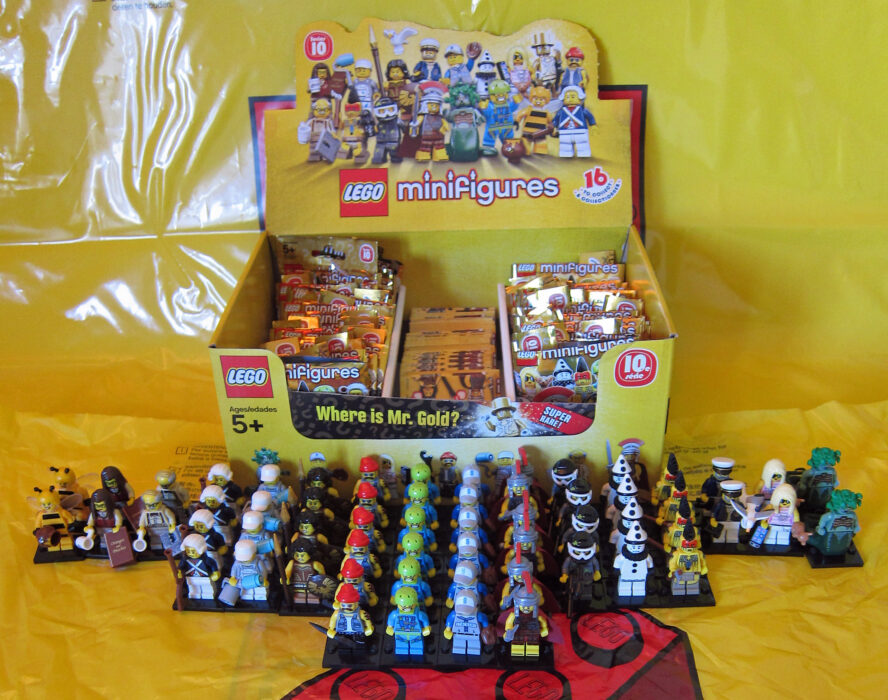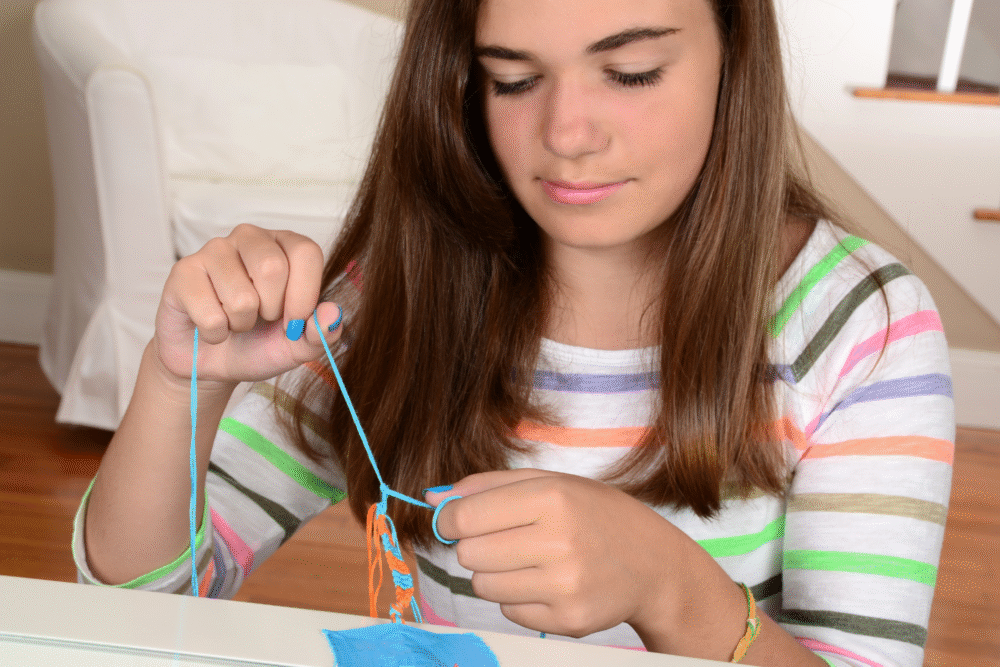What you once did for fun could now fund your next vacation.

Back then, it was just something to pass the time—something you did alone in your room or with a few neighborhood kids on the weekends. You didn’t think about future careers or side hustles while sketching in a notebook, building epic Lego castles, or performing cartwheels on the front lawn. It was just play. But fast forward to adulthood, and some of those childhood passions are now surprisingly profitable if you know where to look.
Many people don’t realize that the hobbies they used to get teased for—or told would “never pay the bills”—have carved out niche markets in today’s economy. Nostalgia sells, creativity is monetizable, and the internet gives almost any passion a path to income. What used to be just a way to stay busy after school might now bring in real cash. These ten childhood hobbies could become your next clever side hustle—or maybe even something bigger.
1. Drawing cartoons could launch a freelance art career.

If you were always doodling on your homework or creating comic strips in the margins of your notebook, that childhood habit could be more valuable than you think, according to Aurora Castella at Shopify. Illustrators are in high demand across publishing, marketing, education, and social media. Digital platforms make it easy to offer commissions or sell artwork on sites like Etsy or Redbubble. You don’t even need a formal art degree—just a recognizable style and the willingness to keep creating.
Some artists find work designing T-shirts, book covers, or stickers. Others make content for YouTubers or influencers who want unique visuals. If you’re consistent and know how to market your style, even fan art can attract a loyal following. Those little cartoon sketches you once got detention for drawing? They might actually pay your bills now—especially if you’re willing to adapt them into digital formats or explore niche markets.
2. Playing video games can lead to real cash flow.

Once considered a “waste of time,” video games have become a billion-dollar industry full of earning potential, as reported by Karolina Wilde at Teachable. If you spent hours mastering a game as a kid, you might already have the skills needed to monetize that interest. Streaming on platforms like Twitch or YouTube can generate revenue through tips, ads, and subscriptions. Even casually skilled players can build a loyal audience by entertaining or educating viewers.
Beyond streaming, there are gaming competitions with cash prizes, opportunities in game testing, or coaching roles for newer players trying to level up. Some gamers even write guides, review new releases, or help developers improve gameplay with feedback. What was once just fun after school now has entire ecosystems around it—and for those with passion and patience, it’s more than possible to turn those hours on the couch into income.
3. Writing stories could become your content creation niche.

If your childhood journals were filled with short stories, fantasy plots, or dramatic diary entries, you might already have the raw talent for a writing-based side hustle, as stated by Anthony Jenkins at Gelato. Today, content is currency—blogs, newsletters, freelance writing, and even serialized fiction on platforms like Substack or Kindle Vella are booming. People want compelling narratives, honest reflections, or simply engaging content they can consume in short bursts.
You don’t need to write a full novel to start earning. Well-written blog posts, email copy, or even caption writing for brands can become a steady income stream. If you’ve got a strong voice and can tap into emotion, humor, or expertise, there’s a niche for you. That wild imagination you once poured into stories about dragons or superheroes could now be the reason someone clicks, subscribes, and pays.
4. Collecting toys might turn into a resale goldmine.

If you were the kid who kept your action figures in their original boxes or begged your parents for limited-edition Beanie Babies, you might be sitting on more than just dusty shelves of plastic. Collectibles have exploded in value, especially if they’re rare or in good condition. Online marketplaces like eBay, Whatnot, or dedicated Facebook groups are packed with buyers hunting down childhood nostalgia.
Even if you sold off your collection years ago, you can still make money flipping collectibles you find at garage sales or thrift stores. The key is knowing what’s trending—certain LEGO sets, Pokémon cards, or 90s toys can sell for hundreds, sometimes thousands. What used to be just your Saturday morning obsession might now be your Saturday income source. If you loved toys back then, you might just love the profits now.
5. Singing in your bedroom could now pay your rent.

If you were always belting out songs in the shower or recording makeshift albums with a tape recorder, there are more ways than ever to turn that into income. You don’t need a record deal or a spot on a reality show. Indie artists can make real money through streaming platforms, live performances, and licensing their music to content creators, commercials, or podcasts.
There’s also a huge demand for background vocals, jingles, voiceovers, and personalized songs. Platforms like Fiverr or SoundBetter let you offer singing services even without professional gear—some clients want authenticity over polish. If you can carry a tune, harmonize, or write catchy lyrics, your childhood passion for music might be your next paycheck. Singing in your room used to be fun. Now, it could also be your side hustle.
6. Baking cookies could become a cottage industry.

If your after-school ritual involved mixing flour, butter, and sugar while the kitchen filled with warm smells, that simple hobby might now be the heart of a profitable business. Home-based baking has taken off—custom cakes, artisan cookies, and holiday treats are all in demand at local markets, online, and through word of mouth. Even unique twists like gluten-free or vegan options give you a competitive edge.
Social media adds a sweet layer of opportunity. Post a few mouthwatering photos, and you might attract customers faster than you expect. People love supporting local, handmade, and nostalgic treats—especially when they look as good as they taste. You don’t need a full bakery to get started, just solid recipes, reliable packaging, and a knack for presentation. That childhood love for licking the spoon? It might just fund your next weekend getaway.
7. Building stuff with Legos can lead to design gigs.

If you spent hours constructing epic Lego creations without following the manual, you were unknowingly sharpening design and spatial skills that translate far beyond childhood. These days, adult fans of Lego (AFOLs) are creating custom sets, displaying builds at conventions, and even getting hired by companies like Lego itself. Some designers build models for museums, marketing campaigns, or influencers who want jaw-dropping displays.
Others turn their skills into digital design gigs—3D modeling, architecture, or animation—because the mindset behind intricate Lego builds is deeply transferable. There’s also a booming market for instruction creators who sell custom Lego plans online. What started as a floor full of bricks might now be a blueprint for income. If you still enjoy building things piece by piece, there’s a good chance someone will pay you to keep doing it.
8. Playing make-believe could land you an acting job.

If you spent your childhood pretending to be a pirate, a teacher, or a superhero—complete with costumes and improvised dialogue—you were already rehearsing for something bigger. Acting isn’t just for Hollywood stars. Voiceover work, commercials, children’s theater, YouTube skits, and social media content all need performers who can step into a role and sell it. Those imagination skills have real-world demand.
Some people start with community theater or TikTok sketches and end up getting paid collaborations. Others find work in audiobook narration, educational videos, or game voice acting. You don’t need an agent to start—just confidence, creativity, and maybe a decent mic. That flair for drama that once drove your siblings crazy might now be your secret weapon for cash. Pretending was fun back then. It could be profitable now.
9. Crafting friendship bracelets can start an accessory brand.

If you were the kid braiding thread into bracelets and giving them out like candy, you might’ve had the early seeds of a business. Handmade accessories are huge on platforms like Etsy and Instagram, and people pay good money for custom, nostalgic, or uniquely personal pieces. You don’t need fancy tools—just creativity, decent materials, and a solid eye for color and design.
Many crafters build loyal followings by offering personalized options, themed bundles, or collaborating with influencers. Others expand into beaded jewelry, anklets, or embroidered patches. The same joy you found in creating something by hand still applies—but now there’s a paycheck attached. That little side project you once brought to school might just be the next viral accessory line. If you loved crafting for your friends, you might love doing it for customers even more.
10. Solving puzzles can lead to income through games and design.

If you loved jigsaw puzzles, riddles, or figuring out how to beat every level of a logic game, your brain might be wired for puzzles in more than just a casual way. Today, puzzle creators are hired to design escape rooms, mobile games, board games, and even educational tools. Some sell printable logic games online or create brain teasers for content creators and teachers.
There’s also a surprising demand for people who solve puzzles live—on YouTube, in speedrun competitions, or in trivia-style game shows. Even designing crossword puzzles or word games for apps can be a niche side hustle. If your favorite pastime was sitting quietly with a Rubik’s Cube or maze book, there’s probably a community—and a market—ready to pay for your skills. The same joy of solving now comes with an added bonus: extra income.
